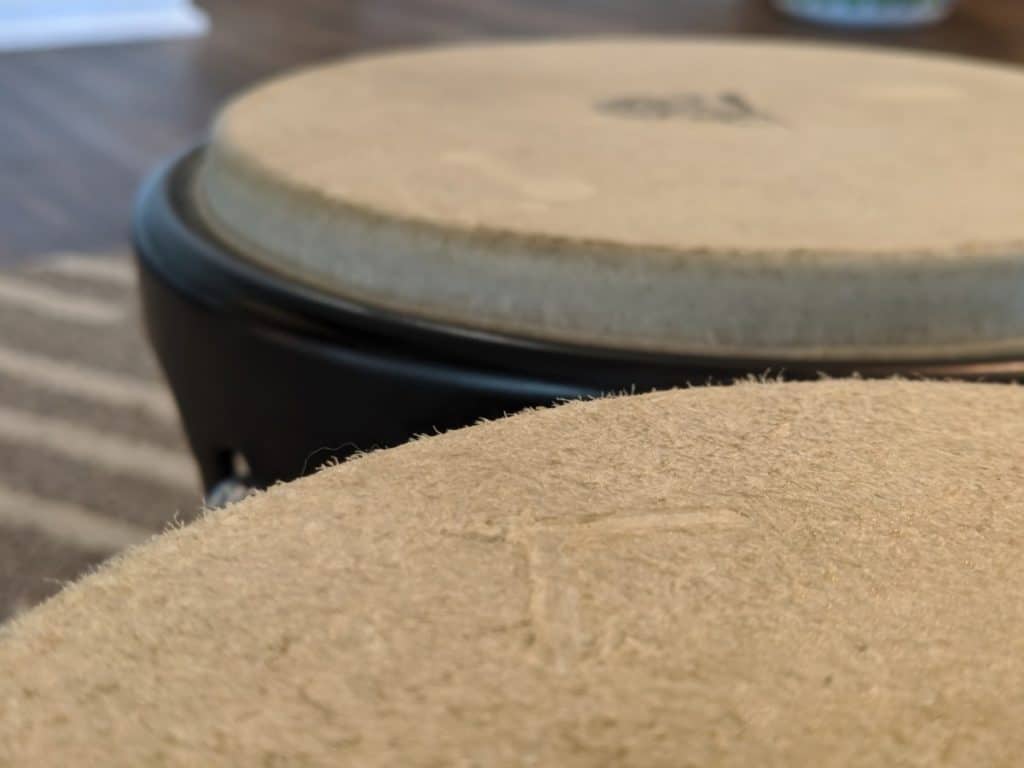This post contains affiliate links. We earn commissions if you purchase products from retailers after clicking on a link from our site. As an Amazon Associate, we earn from qualifying purchases.
Maybe you’ve had your bongo drums for a while, or maybe you just got a brand new set–what kind of maintenance is necessary for the drumheads? Should they be oiled?

By the way, looking for recording equipment and musical instruments? Check out Sweetwater.com for microphones, monitors, audio interface or any other recording gear that you could ever need. (Affiliate Link)
Oiling your drumheads is in most circumstances purely optional. Many drumheads never need any type of maintenance besides being played once in a while and getting the oil from your hands. Excess oil can actually affect the sound and tensile strength of your bongo drums and so any oil application should be made cautiously.
As I was doing research for this subject, I learned that this is one of those controversial topics where it was difficult to find the “right” answer. This is encouraging and also frustrating. I’ve tried to summarize the most valid points in this discussion for you so you can spend more time playing the bongos rather than scouring forums.
Is Oiling Your Bongo Drumheads Necessary?
It depends.
From my own personal experience, I have a pair of LP Aspire Bongos (hey… don’t judge) with authentic animal skins that I’ve had for 13 years, and I have never had to oil these bongo drumheads. That also illustrates that if you don’t play your bongo drums often that the drumheads can last a long time. 🙂
From my research, many people never add oil to their bongo drumheads, and they do not have issues besides the normal wear and tear that comes from drumming.
Every scenario is different. No animal skin type is the same (from mule skin to goat skin or calf skin) and consequently they do not respond the same to humidity. Some animal skins in some dry climates will dry out and even reach a point where skins tear and crack.
In these scenarios, oiling your bongo drumheads may lengthen out the life of your drumheads.
If you buy bongos that use synthetic drumheads, there is no reason to oil the drumheads.
Does Oiling your Bongo Drumheads Protect Them?
There are a few theories going back and forth about whether oiling your bongo or conga drumheads adds a layer of protection. Here are some prevailing theories:
Oil in Your Drumhead Will Repel Water
Since oil and water do not mix, one thought is that if you are a bongo drum player with sweaty hands, then oiling your drumhead will prevent the moisture in your hands from seeping into the drumhead and damaging it. This is a fair point since moisture can definitely pop a drumhead.
Furthermore, oiling your drums in very humid conditions is thought to potentially prevent water from entering in.
Oil in Your Drumheads will Prevent Cracking
The theory of this works conversely to the first point. When your own skin dries out, people add lotion or oils to your skin. Lotion does not in fact moisturize your skin, instead, it seals up your skin to retain the water it has. The thought for putting lotion on your hands and rubbing your drumhead is the same. The lotion or oil will seal in the moisture and prevent your drumhead from drying out.
Do These Methods Work?
These two thoughts could be considered in contrast with each other. Oil in any case acts like when we wear a rainjacket. It keeps water in (which is why you often can feel sweaty in a rain jacket), but it also keeps water out.
I can’t speak for every situation as there hasn’t been enough real testing to find out for sure, but in the very least, many people oil their drums for these reasons above.
What Is the Downside of Oiling Your Bongo Drumheads?
You probably won’t damage your bongo drumheads if you put on oil, but the main reason why you need to be very careful about what you put on your drumheads is that it affects the sound.
You can see and hear this in action in this video:
These are conga drums, and not bongos, but they have many similar characteristics. You can hear the difference very noticeably. The post-oiled conga drums have a deeper darker sound.
This can be a good thing, or it can be a negative effect (depending on what you’re going for). For a lot of bongo players, many are looking for a bright pop from their macho drum (the smaller drum in a set of bongos)–therefore adding oil can take away some of that pop giving you a sound you’re not looking for.
Furthermore, since the oil can deaden and lower the pitch of the drum, many people actually will tighten their drumheads after applying oil. This can be a bad thing, even if adding oil helps the skin elasticity, you may be pushing your drumheads past the point that’s safe for the bongo drums.
When is it a Good Idea to Oil Your Bongo Drumheads?
As I have mentioned through this article, it really depends on your situation and tastes whether it’s ever a good idea to oil your bongos. Common circumstances that drive people to oil their bongos are the following:
- Very dry climates: If you are regularly experiencing humidity less than 30%, then there’s a good chance that you will at least think about oiling your bongo drumheads
- If you have really dry hands: If your knuckles are the type that are constantly cracking, then playing bongos for an extended period of time can be uncomfortable. Adding lotion to your hands before you play will also lotion the drums, making it a bit more comfortable to play
- Some custom-made bongo drums that use certain mule skins often achieve their desired sound by a process of soaking them in oil for a period of time. This is definitely not true of most drumheads.
- Your bongo drumheads are changing consistency and are cracking: Some oil can extend the life of your drumhead
- If your bongo drumheads are peeling a bit (kind of like how an old t-shirt “pearls” or gets that linty stuff on it), then you can add some oil to increase the drumhead cohesion.
Best Oil for Your Drumheads
Whatever oil you choose for your animal skin drumheads, remember, less is more! … well.. it is more or less at least.
If you add too much oil, there’s not much you can do to go back. On the other hand (ba-doom psh), if you only add a small amount of oil, then you can experiment carefully and ensure your drumheads reach the consistency you want and you haven’t adversely affected the sound.
Here’s a list of common drumheads
Olive Oil: A thin oil that is often used for cooking. Many drummers use this as their drumhead oil. You can apply a little on your hands first and then rub your bongo drumheads to apply thin olive oil directly to the surface of your drum is not a good idea.
Palm Oil: Also called “Manteca De Corojo” and is a very popular option for many drummers. This is a natural product that is thick in its consistency. Start with a penny-sized dollop.
Shea Butter: Often used in a lot of lotions and creams, Shea butter is extracted from Shea tree nuts. Start with a penny-sized dollop
Lanolin: Lanolin is in a lot of products, but it can be sold in its very basic form. It’s often sold as an ointment for breastfeeding mothers. Lanolin is extracted from sheep wool, and I’d say if you were looking for a substance that’s extremely natural then I don’t think you can get much better than lanolin.
